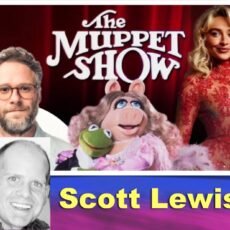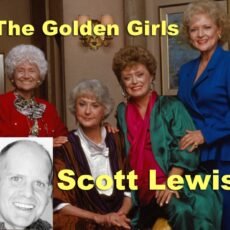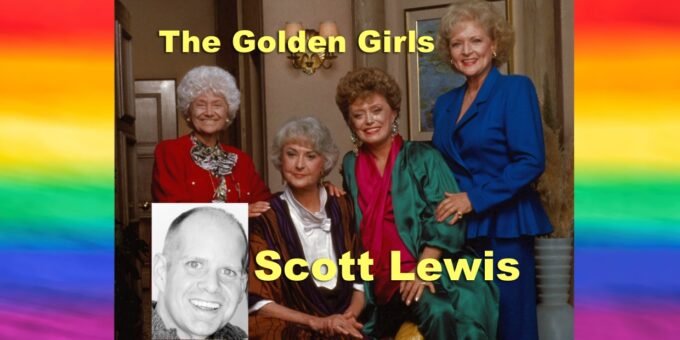
Forty years after four fearless women moved into a Miami house and into our lives, The Golden Girls remains a cultural lodestar — particularly for the LGBTQ+ community.
Still Golden: How The Golden Girls
Became an LGBTQ+ Touchstone
ABC’s upcoming 20/20 special, The Golden Girls: 40 Years of Laughter and Friendship — Special Edition of 20/20, revisits the show’s radical warmth, its bold storytelling around gay life, and the deep, abiding connection between Bea, Betty, Rue, and Estelle and the queer community.
Easy to Forget…
It’s easy now to forget how risky a prospect The Golden Girls was when NBC’s head of entertainment, Brandon Tartikoff, had the idea. In Hollywood at that time, women over 35 were widely considered “box-office poison” — a belief that female leads lost audience draw past a certain age.
Casting four women in their 50s and 60s as the central protagonists defied every show business norm of the era. That gamble now looks prescient: the show didn’t just succeed — it exploded, breaking ratings records and proving that audiences wanted honest, funny stories about mature women. For LGBTQ+ fans, the show’s very existence felt like a statement: there’s room on television for people who don’t fit narrow pop-culture profiles.
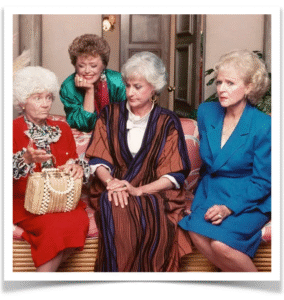 It Still Resonates to
It Still Resonates to
LGBTQIA+ people
today, but for us, they
were Trailblazers!
The Golden Girls still matters to LGBTQ+ audiences today because of its innovative storytelling and the one-liners that could have come out of the mouth of any queen of the day. But for those of us watching it in its first run, this show, its writing room, and the actresses behind the girls themselves did more for us than we could have ever accomplished on our own. And it was intentional.
They took our truth into living rooms all over the world that we would have never been allowed in ourselves. In doing so, they were able to start frank conversations in homes that advanced our acceptance on a timeline we could never have achieved. This was in the midst of the AIDS Pandemic, which was widely accepted as God’s punishment for our very being. They smartly pleaded our case for us with a reach we did not have to those who did not know us while they sat in the safety and comfort of their own home. When beamed in through television, our existence did not feel threatening to them.
They told our truth, our stories, to the audience that needed to hear it most. In their run, they beamed episodes that helped people understand issues in a new way. They showed the family of choice, its history, importance, and value. They showed the coming-out process and its difficulty from both sides. They showed the experience of learning that a family member is gay and the process of acceptance. They even took on gay marriage long before it was on anyone’s radar. They also boldly took on issues of importance showing the empathetic side of issues such as immigration, the suffering of the newly recognized Cronic Fatigue Syndrome, Sex in your 80’s and so much more.
When it came to LGBTQ+ themes, The Golden Girls treated our issues with an empathy that was rare on mainstream television in the 1980s and early ’90s. Episodes like the two featuring Blanche’s Gay brother, Clayton, the visit of Dorothy’s lesbian friend Jean, and the pilot episode that featured the fifth “girl”-Coco, the gay live-in housekeeper, are considered some of the best episodes of television ever produced.
This acceptance and inclusion resonated with LGBTQIA+ viewers because we so rarely saw our lives reflected onscreen. The show’s core values — fierce loyalty, support, laughter in the face of hardship — mirrored the realities of many LGBTQ+ people building chosen families when our biological ones weren’t safe or supportive.
Ahh, the one-liners…
No one did them better, before or since. I will not dare to offer any kind of list of the best one-liners. It would be infinite, and omissions would offend. I will only share one of my favorites: a Master Class for anyone involved in episodic television. “The man’s as gay as a picnic basket.”-Sophia. The episode’s focus is on Clayton, Blanche’s visiting brother. The episode leads us through the coming-out process and its impact on all those involved, but what it did so smartly was offer us an unvarnished look from both perspectives. Rue McClanahan navigates phases typical for someone learning a family member was gay and did it with empathy and a sincerity that translated the angst that was the coming-out process to everyone involved.
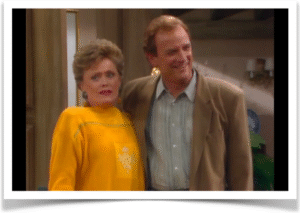
“The Man’s as gay
as a picnic basket!”
– Sophia
During the original run of the show, it was more likely than not that coming out would cause a dynamic change within any family unit. The Golden Girls took this on and told the story from both sides. In this episode, through Blanche, we experience the instant disbelief, followed by the fear that was naturally felt for the LGBTQIA+ family member at that time, and finally acceptance.
When Blanche Deverouxe comes to the understanding that nothing has really changed. Rue Maclanahan brilliantly communicates our message through her realization. “It’s just common sense,” is her message. He is still the same brother as always. She communicates with laser precision our message to those who need to hear it most.
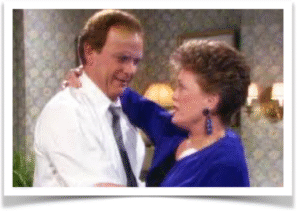 She then ever so subtly invites all in her audience to begin their own journey. “You probably won’t finish yours in half an hour”, she tells her audience without words, but her message is there. You can imagine Blanche winking as a nudge to her audience, asking them, without words, to just start their journey to acceptance.
She then ever so subtly invites all in her audience to begin their own journey. “You probably won’t finish yours in half an hour”, she tells her audience without words, but her message is there. You can imagine Blanche winking as a nudge to her audience, asking them, without words, to just start their journey to acceptance.
She knows if they start, they may come to the same conclusion she did. “They are the same person; this does not change them. It was just one secret. I can almost hear her telling her brother upon her epiphany, “One secret shouldn’t change our relationship, darlin’. Hell, everybody’s got one.”
The Show’s Big Secret
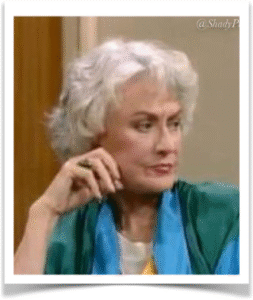 On set, the four leads created a famously warm, familial atmosphere that translated onscreen. While cast and crew have repeatedly said that the actresses’ off-camera friendship — long phone calls, shared holidays, and mutual support — informed the show’s authentic portrayals of friendship, this was not true for Bea Arthur and Betty White. For reasons unknown to this day, Bea viciously hated Betty, being widely known to use an incredibly vulgar slur whenever speaking about White.
On set, the four leads created a famously warm, familial atmosphere that translated onscreen. While cast and crew have repeatedly said that the actresses’ off-camera friendship — long phone calls, shared holidays, and mutual support — informed the show’s authentic portrayals of friendship, this was not true for Bea Arthur and Betty White. For reasons unknown to this day, Bea viciously hated Betty, being widely known to use an incredibly vulgar slur whenever speaking about White.
Their love for us was genuine
Each actress cultivated a real-world rapport with the LGBTQ+ community. Their public appearances, campy self-awareness, and willingness to speak up for gay rights helped transform the show from a sitcom into a sanctuary.
What is lesser known is the extent of their generosity. Estelle Getty delivered meals to homebound AIDS patients before, during, and long after the run of the show. Bea Arthur left $300,000 upon her passing to an organization providing housing and a path to a better life for homeless Queer kids. Rue McClanahan, who contractually owned anything she wore on the show, instructed that it all be auctioned after her death, with all proceeds benefitting AIDS organizations. They sincerely held us in their hearts as their Family of Choice.
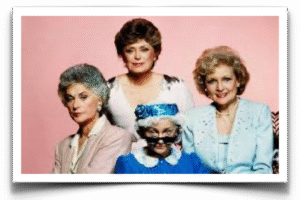 Still The Most
Still The Most
Popular Girls
in School
Over the decades, the fandom only deepened: drag numbers at Pride events routinely riff on the show’s lines and looks; countless grassroots screenings and watch parties, Drag reinactments of episodes in playhouses and gay bars all over the country have only generated more attention for the series.
Recently, that enduring fandom culminated in a highly successful Golden Girls convention that drew thousands of attendees: a weekend of panels, screenings, drag tributes, vendors, and fans dressed as their favorite characters. The convention’s success underscored that four decades later, the show’s humor, heart, and queer resonance remain unmatched.
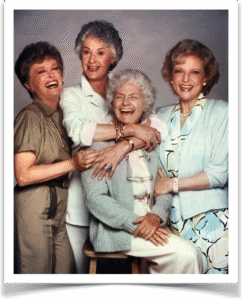 More importantly, The Golden Girls is an important part of queer history. They helped instigate conversations about us that would not have happened otherwise. They were the first to be so bold, to go so far to tell our truth. That is something to be celebrated.
More importantly, The Golden Girls is an important part of queer history. They helped instigate conversations about us that would not have happened otherwise. They were the first to be so bold, to go so far to tell our truth. That is something to be celebrated.
The Golden Girls: 40 Years of Laughter and Friendship — Special Edition of 20/20 is a celebration of a show that told our story in an intelligent, articulate way that was gentle enough to be accepted while having the boldness to change minds.
The special will touch on the show’s meaning and legacy to our community and even features trans icon Laverne Cox talking about how this series changed our world for the better.
Through laughter, tears, and don’t forget cheesecake, it cleverly told our story in a way that helped change the cultural landscape moving forward. Forty years on, those golden roommates still teach us how to love loudly, fight gently, and stay fiercely loyal — and this special is just a reminder of why they still matter. Audiences certainly agree they still matter as the series has become one of the most-streamed TV shows of all time, with over one billion hours streamed.
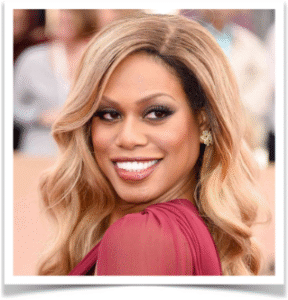 Other celebrities stopping by to pay tribute include George Clooney, Kelly Ripa, and Original Dreamgirl Sheryl Lee Ralph, better known today for Abbot Elementary.
Other celebrities stopping by to pay tribute include George Clooney, Kelly Ripa, and Original Dreamgirl Sheryl Lee Ralph, better known today for Abbot Elementary.
The Golden Girls: 40 Years of Laughter and Friendship — Special Edition of 20/20 is available to stream on Hulu.


